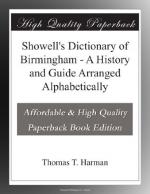—— —— —— —— —— —— —— —— —— ——
1788 3608 3117 3053 1660 1625 1659 1594 963 1235
[1]
[1] [Transcriber’s note: This is an error; the column adds up to 1270]
Under the heading of “Miscellaneous” are included such erections as libraries, public halls, clubs, arcades, slaughterhouses, cowsheds, and all other necessary and useful buildings appertaining to human hives, but which need not be particularised.
Probate.—The Probate Registry Office is at No. 15, Old Square.
Promenades—When Corporation Street is finished, and its pathways nicely shaded with green-leaved trees, it will doubtless be not only the chief business street of the town, but also the most popular promenade. At present the gay votaries of dress and fashion principally honour New Street, especially on Saturday mornings. Hagley Road, on Sunday evenings, is particularly affected by some as their favourite promenade.
Proof House.—The foundation stone of the Proof House, Banbury Street, was laid October 4th, 1813, the yearly number of gun, rifle, and pistol barrels proved at the establishment averages over half a million.—See “Trades”
Property.—The Birmingham Property Owners’ and Ratepayers’ Protection Association was formed in May, 1872. Out of 70,000 separate assessments the owners pay the rates in more than 50,000 cases.
Provident Dispensaries.—See “Dispensaries.”
Provident Societies.—See “Friendly, benevolent, and Provident Institutions.”
Provincialisms.—Like the inhabitants of most other parts of the country Birmingham people are not without their peculiarities of speech, not so strongly characterised perhaps as those of the good folks of Somersetshire, or even some of our neighbours in the Black Country, but still noticeable. For instance, few workmen will take a holiday; they prefer a “day’s out” or “play.” They will not let go or abandon anything, but they “loose” it. They do not tell you to remove, but “be off.” They prefer to “pay at twice” in lieu of in two instalments. The use of the word “her” in place of “she” is very common, as well as the curious term “just now,” for an indefinite time to come, as “Her’ll do it just now,” instead of “She will do it soon.” In vulgar parlance this book is not your own or our own, but “yourn” or “ourn,” or it may be “hisn” or “hern.” In pronunciation as well, though perhaps not so markedly, our people are sometimes peculiar, as when they ask for a “stahmp” or put out their “tong,” &c., stress being often laid also on the word “and,” as well as upon syllables not requiring it, as diction_ary_, volun_teers_, &c.




